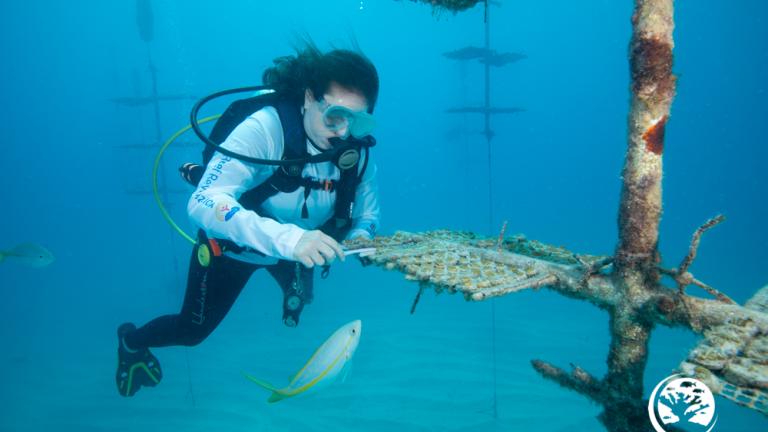Confronting the Coral Crisis with United Way of Collier and the Keys

U.S. Navy Commodore David Porter was stationed in the Florida Keys in the 1820s. In one of his letters, he wrote: "These islands, though low and sandy, possess a charm that is irresistible. The surrounding sea, so brilliantly clear, allows one to see the mysterious depths, where nature flourishes unspoiled and serene." Like author Ernest Hemingway and naturalist John James Audubon, Porter was overcome by the beauty of the Keys and committed his awe to history. Today, the Keys' coral reefs remain a cornerstone of their ecological prestige, but natural and manmade obstacles threaten their beauty and survival.
The Science of Survival
The Florida Keys are islands stretching 120 miles off the southern tip of Florida. The islands are surrounded by the Florida Keys National Marine Sanctuary (FKNMS), which helps protect local marine resources and their use. The FKNMS hosts vibrant coral reefs and seagrass beds, vital ecosystems underpinning the state's fishing, diving, and tourism sectors. Various elements, including water quality, hurricanes, and disease, influence these habitats' well-being. The Keys' once vibrant marine ecosystem is in severe decline, leading to the deterioration of over 98% of coral cover on the reefs.
High marine temperatures also stress coral, which are living creatures that feed on algae that give them their color and nutrients. When temperatures reach 87 degrees Fahrenheit, coral shows signs of stress, like expelling algae and turning white or "bleached." The dramatic 2023 coral bleaching event left many species struggling to survive and compelled scientists and conservationists to enhance and expedite Keys' ecology protection efforts.
United Way of Collier and the Keys intensified its coral conservation programs. With a $3.5 million gift from the United Arab Emirates, they joined the National Oceanic and Atmospheric Administration (NOAA) in the mission to restore seven iconic reef sites in the Florida Keys in 2020. This is one of the most significant investments in reef restoration anywhere in the world. Mission: Iconic Reefs is a NOAA partnership that aims to restore live coral coverage from the current 2% to an ecologically sustainable level.
United Way of Collier and the Keys supports local reef restoration projects that perform coral outplanting, which grows coral from nurseries and attaches it to bare spots on the reef. To achieve this, United Way funds visionary practitioners in coral restoration to pioneer new in-water coral nursery and outplanting methods. United Way Marine Biologist Jessica Dockery is confident their partners' innovation is the best strategy for overcoming the coral crisis. She says, "One of the biggest problems is upscaling the project to keep up with everything that's been lost. These corals grow slowly, maybe only a quarter of an inch a year. One of our practitioners is ahead of the game, keeping up with the numbers that are needed."
Over the last three years, UWCK has supported 7,349 square meters, or approximately 1.83 acres, of coral outplanted on the identified reefs. This coral will grow, and the coverage area will continue to expand naturally to the healthy, sustainable coverage needed for the reef to flourish. So far, 8,400 volunteer hours, 199 interns, and 11 jobs supported these efforts through UWCK's funding.
The Circle of Life
The issue of the reefs is not limited to preservation and protection. The coral reefs are the basis of the Florida Keys economy, and 5 million people visit each year to participate in ocean recreation. Overall, NOAA suggests that coral reefs in Southeast Florida provide economic goods and services worth about $375 billion each year, or an asset value of $8.5 billion. For Floridians, this means 70,400 full and part-time jobs. Protecting the environment saves jobs and livelihoods, offers opportunities for youth to be educated in Marine Sciences, shores up community expertise, prepares individuals for stable employment, and, in turn, advances the environmental efforts that sustain local livelihoods. Overall, it is a comprehensive approach to building and sustaining resilient communities.
Keys Area President Leah Stockton says, "Our traditional financial stability, health, and education work with United Way partners and programming overlaps with the reef revitalization project. We've spent a lot of time connecting the opportunities available to our funded nonprofit partners through this project, and vice versa."
Around the world, United Ways are working to build environmentally resilient communities through conservation, protection, food security, and disaster relief. If you want to support this work, connect with your local United Way to learn more.